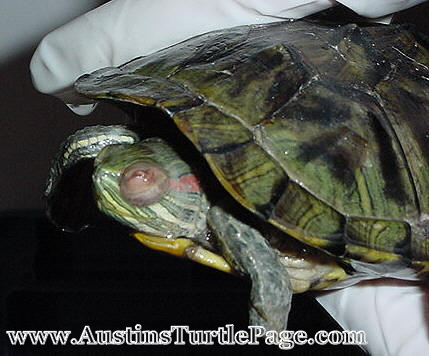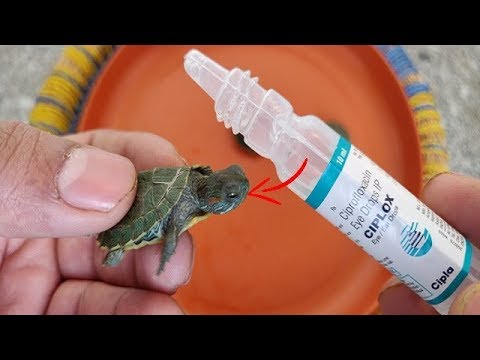Turtle eye infection can be treated with a combination of antibiotics and proper hygiene. Infection in a turtle’s eye can cause discomfort and lead to serious health issues if left untreated.
Providing the turtle with a clean and appropriate environment, ensuring proper nutrition, and consulting with a veterinarian for antibiotic treatment can help alleviate the infection and promote healing. Regular observation and care are essential to prevent further complications and maintain the turtle’s overall well-being.
By following these steps, turtle owners can effectively treat eye infections and ensure the health and happiness of their pet turtles.

Credit: www.austinsturtlepage.com
Common Causes Of Turtle Eye Infections
Turtle eye infections are commonly caused by poor water quality, an insufficient diet, and a lack of uvb lighting. These factors can lead to various complications, including redness, swelling, discharge, and even blindness in extreme cases. Maintaining clean and well-filtered water is essential to prevent infections.
Additionally, providing a balanced and nutrient-rich diet with appropriate supplements can boost the turtle’s immune system and promote eye health. Moreover, uvb lighting is crucial for turtles as it helps in the production of vitamin d, which is vital for overall eye health.
Regular veterinary check-ups are recommended to monitor and treat any potential eye infections promptly. Remember, a healthy environment and a well-balanced diet are key to preventing turtle eye infections.
Identifying Symptoms Of Turtle Eye Infections
Turtle eye infections can be identified by symptoms such as swollen eyes, redness, and irritation. Other signs include excessive tearing or discharge from the eyes. It is important to pay attention to these symptoms as early detection can lead to effective treatment.
Providing your turtle with proper care, including a clean environment and a balanced diet, can help prevent eye infections. Regularly checking your turtle’s eyes for any changes or abnormalities is also crucial. If you notice any of these symptoms, it is advisable to consult a veterinarian who specializes in reptiles for a proper diagnosis and treatment plan.
Taking prompt action can ensure the well-being of your pet and help prevent any further complications.
Step-By-Step Guide To Cleaning A Turtle’S Infected Eye
Turtle eye infections can be treated with a step-by-step cleaning process. First, gather the necessary supplies. Then, restrain the turtle to prevent injury. Next, gently clean the infected eye using a soft cloth or cotton swab. Finally, administer the prescribed eye drops as instructed by a vet.
By following these guidelines, you can ensure proper care for your turtle’s eye infection.
Dietary Improvements For Preventing And Treating Eye Infections
Incorporating vitamin-rich foods can greatly aid in preventing and treating eye infections. A balanced diet that includes these essential nutrients is crucial for maintaining good eye health. Calcium and vitamin d levels should also be monitored to ensure optimal eye function.
By following these dietary improvements, you can effectively support your turtle’s eye health and prevent infections from occurring.
Creating A Healthy Environment For Your Turtle
Creating a healthy environment for your turtle includes maintaining clean water, proper lighting conditions, and regular tank maintenance. As a responsible turtle owner, it’s important to ensure that the water in their tank is kept clean and free from any contaminants or bacteria.
Regular water changes and the use of filtration systems can help achieve this. Additionally, providing the right amount and type of lighting is crucial for your turtle’s overall health and well-being. Uvb lights are essential for their calcium metabolism and overall shell health.
Lastly, regular tank cleaning and maintenance, such as removing uneaten food and waste, helps prevent the growth of harmful bacteria and maintains a safe living space for your turtle. By following these guidelines, you can help prevent turtle eye infections and keep your pet happy and healthy.
When To Consult A Veterinarian
Consult a veterinarian if your turtle shows severe or persistent symptoms. Failure to respond to home treatment should also be a reason for concern. Additionally, be mindful of any unusual behaviors in your turtle. These signs could indicate a more serious eye infection that requires professional attention.
Remember, it’s essential to seek help from a veterinarian who specializes in reptile care to ensure proper diagnosis and treatment. Taking prompt action will help prevent further complications and promote your turtle’s well-being. Always prioritize your pet’s health and consult a professional when in doubt about their condition.
What To Expect During A Veterinary Visit
During a veterinary visit, expect a thorough physical examination of your turtle. The veterinarian will check for any signs of eye infection or other health concerns. Diagnostic tests may be performed to determine the underlying cause of the infection. Based on the results, the veterinarian will recommend appropriate treatment options and discuss the best course of action for your turtle’s recovery.
It is crucial to follow the veterinarian’s advice and administer any prescribed medications as directed. Remember to provide a clean and comfortable environment for your turtle to aid in its healing process. Regular check-ups may be necessary to monitor the progress and ensure the infection is fully treated.
Taking proactive measures and seeking professional help promptly are key to the successful treatment of turtle eye infections.
Preventing Future Turtle Eye Infections
Regular check-ups are crucial in preventing future turtle eye infections. Routine eye care helps detect any signs of infection early on. By implementing preventive measures, such as keeping the tank clean and providing proper nutrition, the risk of infection can be minimized.
It is important to carefully monitor the turtle’s behavior and any changes in its eyes. Timely treatment should be sought if any symptoms of infection, such as redness or discharge, are observed. Providing a healthy environment and maintaining good hygiene practices can significantly reduce the chances of turtle eye infections.
Remember to consult a veterinarian for expert guidance on turtle eye care.
Conclusion
Providing proper treatment for turtle eye infections is crucial for maintaining the overall health and well-being of these unique creatures. By understanding the causes, signs, and symptoms of eye infections in turtles, you can take the necessary steps to prevent and treat these conditions effectively.
Regularly inspecting your turtle’s eyes, keeping their environment clean, and providing a balanced diet can greatly reduce the risk of eye infections. In case your turtle does develop an infection, consulting a veterinarian is essential for a proper diagnosis and treatment plan.
Whether it’s through medication, topical solutions, or simple hygiene practices, addressing eye infections promptly can help alleviate discomfort and prevent long-term damage. Remember, the eyes are a window to your turtle’s health, so prioritize their eye care to ensure a happy and healthy life for your shelled companion.





Leave a Reply